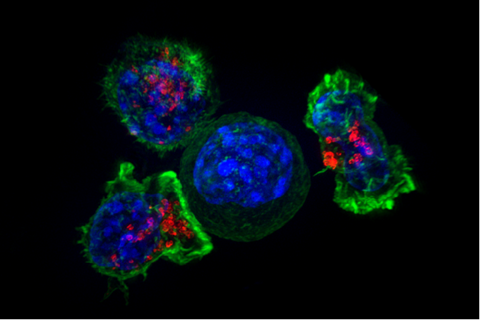Microbiotica, a clinical-stage biopharma company developing a pipeline of oral precision microbiome medicines called live biotherapeutic products (LBPs), has presented new data on the mechanism of action of MB097 at the American Association for Cancer Research AACR IO meeting held in Los Angeles, February 23-26.

MB097 is an LBP in development as an adjunct to immune-oncology treatments such as MSD’s (Merck & Co., Inc., Rahway, NJ, USA) anti-PD-1 therapy, KEYTRUDA® (pembrolizumab).
READ MORE: Gut microbiome influences location and type of immune cells
READ MORE: Microbiome molecule may hamper immune cells’ cancer-fighting abilities
Dr Mat Robinson, Microbiotica’s Senior Vice-President of Research, presented data from new pre-clinical studies in a poster entitled “Clinical response to immune checkpoint inhibitors in melanoma is associated with distinct gut bacterial species that promote anti-tumor immunity by different mechanisms”. The poster can be accessed here.
Immune-oncology treatments
The bacteria comprising MB097 were found to be associated with response to immune-oncology treatments, such as KEYTRUDA® (pembrolizumab), in multiple cohorts of melanoma patients. These new data demonstrate that the bacterial strains within MB097 can interact directly with dendritic cells to potently activate cytotoxic T lymphocytes (CTL).
In addition, certain MB097 bacteria also produced metabolites that enhanced the tumor cell-killing potential of CTLs. One strain released metabolites that reversed the inhibitory effects of tumor-associated macrophages.
Mat Robinson, Microbiotica’s Senior VP of Research, said: “These data begin to identify the different mechanisms by which gut commensal bacteria drive immunotherapy response.”
MB097 is being tested in an international Phase Ib clinical study, in combination with KEYTRUDA® (pembrolizumab), MSD’s anti-PD-1 therapy, in patients with cutaneous melanoma who have failed to respond to immunotherapies. Data readout expected by the end of 2025.
Background
Microbiotica is a private, clinical-stage, biopharma company developing a pipeline of oral precision microbiome medicines called live biotherapeutic products (LBPs) with lead programs in immuno-oncology and inflammatory bowel disease. The company has a clinic-led, purpose-built, proprietary, microbiome profiling platform to support drug discovery based on clinical data, which enables precision identification of bacteria associated with favorable clinical trial outcomes in specific patient populations. The company has significant expertise in microbiology, bioinformatics, translational biology and LBP manufacturing and development.
The Company is creating a novel pipeline of programs in immuno-oncology (MB097 for advanced melanoma), and inflammatory bowel disease (MB310 for ulcerative colitis). It has a major partnership with Cancer Research UK and Cambridge University Hospitals in immuno-oncology. The company has a clinical trial supply agreement with MSD (Merck & Co., Inc., Rahway, NJ, USA) for use of KEYTRUDA in evaluating MB097 in melanoma patients with primary resistance to anti-PD-1 immunotherapy. MB310 was developed in collaboration with the University of Adelaide. Both programs have data read-outs in 2025.
Spun out of the Wellcome Sanger Institute in 2016, the Company is based in purpose-built facilities at the Chesterford Research Park near Cambridge, UK. Microbiotica has raised more than £62 million equity investment, including a £50 million Series B in 2022, with venture investors including British Patient Capital, Cambridge Innovation Capital, Flerie Invest, IP Group plc, Seventure Partners and Tencent. The company has also received financial support from the US-based Crohn’s and Colitis Foundation.







No comments yet